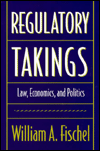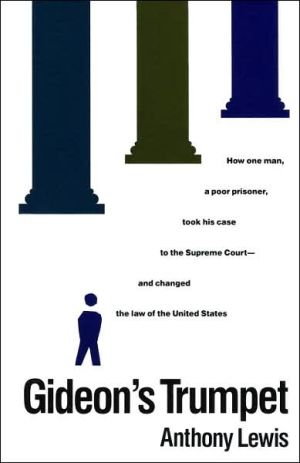Regulatory Takings: Law, Economics, and Politics
Are rent controls and zoning regulations unconstitutional? Should the Supreme Court strike down the Endangered Species Act when its administration interferes with the use of private property? These questions are currently debated under the doctrine of regulatory takings, and William Fischel's book offers a new perspective on the issue.\ Regulatory Takings argues that the issue is not so much about the details of property law as it is about the fairness of politics. The book employs...
Search in google:
Are rent controls and zoning regulations unconstitutional? Should the Supreme Court strike down the Endangered Species Act when its administration interferes with the use of private property? These questions are currently debated under the doctrine of regulatory takings, and William Fischel's book offers a new perspective on the issue.Regulatory Takings argues that the issue is not so much about the details of property law as it is about the fairness of politics. The book employs jurisprudential theories, economic analysis, historical investigation, and political science to show why local land use regulations, such as zoning and rent control, deserve a higher degree of judicial scrutiny than national regulations.Unlike other books on this topic, Regulatory Takings goes beyond case law to buttress its arguments. Its reality checks range from reviews of statistical evidence to local inquiries about famous takings cases such as Pennsylvania Coal v. Mahon and Lucas v. South Carolina Coastal Commission. The gap between legal theory and on-the-ground practice is one reason that Fischel investigates alternative means of protecting property rights.Local governments are often deterred from unfairly regulating portable assets by their owners' threat of "exit" from the jurisdiction. State and federal government regulations are disciplined by property-owner coalitions whose "voice" is clearly audible in the statehouses and in Congress.Constitutional courts need to preserve their resources for use in areas in which politics is loaded against the property owner. Regulatory Takings advances an economic standard to decide when a local regulation crosses the border from legitimate police power to a taking that requires just compensation for owners who are adversely affected. Carol M. Rose - Yale Law Journal Regulatory Takings launches a surprisingly energetic shove at property law's most Sisyphean rock...[Fischel has] written a book packed with interesting ideas and marvelous examples, a book that should inform the modern legislative and jurisprudential debate. What's more, his book reads as if the research was simply a lot of fun... Fischel's sheer exuberance in ferreting out data, and his diligence in examining vast numbers of theories, put most land-use scholars to shame...Readers with the slightest interest in takings issues should read Fischel's work for themselves.
PrefaceIntroduction11Of Coase and Coal: Regulatory Takings in the U.S. Supreme Court132Eminent Domain's Democratic Origins and Economic Cycles643Constitutional Law, Process Theory, and Democratic Commitment1004The Economic-Utilitarian Theories of Michelman and Epstein1415Rational Expectations and Contractarian Conventions1836Capitalizing on Land Use Regulation: Evidence from California2187Zoning, Capitalization, and the Efficiency of Local Government2538How Exit and Voice Discipline Governmental Excess2899Remedies for Unfair Land Use Restrictions and Exactions325Case References371General References377Index407
\ Issues in Science and TechnologyFischel uses local land-use regulation as a vehicle for exploring the relationship of law, economics, and the political process. This he does skillfully and with erudition. His critiques of the writings of leaders in the field of law and economics—Ronald Coase, Robert Ellickson, Frank Michelman, Richard Epstein, and others—provides a useful and balanced presentation of contrasting perspectives from the literature of law and economics. His review of many takings cases is equally stimulating.\ — Rutherford H. Platt\ \ \ \ \ \ Journal of Economic LiteratureThis book harks back to an era when economists such as John R. Commons believed that economics, politics, and law were part of the same subject, when systematic inquiries into the complexities of social and economic institutions were an important part of the economics profession. The book has the further great advantage that it is written in a clear and occasionally elegant prose style...[T]he great strengths of the book are the high quality of writing, the many fascinating case studies and other details, and the comprehensive coverage of the literature...[I]t should be the starting point for any economist inquiring into the subject [of takings].\ — Robert H. Nelson\ \ \ \ Land EconomicsThere is much more of note in Fischel's book than the elaboration of [his] intriguing proposal. For example, no student of land use should miss his detailed discussion of the facts in Pennsylvania Coal v. Mahon. There is much more to that case than we have ever thought before. Additionally, Fischel develops an intriguing theory of cycles in the judicial and legislative willingness to compensate owners when their property is taken...Finally, the book contains an extensive, nontechnical, and superb summary of the law-and-economics literature on various aspects of regulatory takings.\ — Thomas S. Ulen\ \ \ \ \ \ Law and Politics Book ReviewIn this rich volume, Fischel critically assesses the central debates on the regulatory infringement of property rights, the adjudication of disputes surrounding regulatory takings, and the weighing of key values that should be addressed in the process...Fischel takes the reader through a fascinating set of arguments and debates...Regulatory Takings is a fine contribution to the literature. It is logically arranged, coherently argued, and written with flair and humor...Fischel's book [is] likely to assume a place next to other classics in the field and shape future discussions of the takings issue. This volume should be widely read by scholars of public law, law and economics, regulation, and public policy.\ — Marc Allen Eisner\ \ \ \ \ \ Michigan Law ReviewIn William Fischel's excellent recent book...[he] journeys far and wide over one of the pivotal questions of our time: What are the permissible limitations on government regulation of private property?...All too often today, economists become mired in abstract theory or trapped by detailed econometric demonstrations. Fischel's readable book avoids both of these unfortunate extremes and concentrates with intelligence and balance on the institutional arrangements at stake in particular cases, with an eye to explaining long-standing practices by sensible, mid-level economic theory.\ — Richard A. Epstein\ \ \ \ \ \ Political Studies[W]ell researched, well written, and highly informative.\ — William A. Maloney\ \ \ \ \ \ Public ChoiceFischel's approach...considers not only the legal, economic and political considerations alluded to in his subtitle, but also case-specific and historical assessments of the development of Takings doctrine...Regulatory Takings is a pleasure to read. It is lucid and engagingly written, and achieves accessibility for those who are not experts on Takings without sacrificing sophistication.\ — David A. Skeel\ \ \ \ \ \ Southern Economic JournalistThe situation is complicated, but Fischel, who has spent much of his life teaching and acting in this area, is as well qualified to write about it as anyone can be. Unlike Epstein who has strong theoretical views as to what should be done, Fischel's position is basically practical. He feels that landowners whose land is subject to some kind of change that may injure them have two sources of protection, one of which is the use of pressure on democratic elected groups, and the other is the courts. Much of this book is devoted to detailed discussions of where the remedy should lie in specific instances...Anyone interested in this field can find no better guide to what has been done, and what can be done.\ — Gordon Tullock\ \ \ \ \ \ Yale Law JournalRegulatory Takings launches a surprisingly energetic shove at property law's most Sisyphean rock...[Fischel has] written a book packed with interesting ideas and marvelous examples, a book that should inform the modern legislative and jurisprudential debate. What's more, his book reads as if the research was simply a lot of fun... Fischel's sheer exuberance in ferreting out data, and his diligence in examining vast numbers of theories, put most land-use scholars to shame...Readers with the slightest interest in takings issues should read Fischel's work for themselves.\ — Carol M. Rose\ \ \ \ \ \ BooknewsDiscusses the capacity of the courts to protect property interests, demonstrates that property is often protected by nonjudicial means, and suggests an economic standard to decide when a local regulation crosses the line from legitimate police power to a taking that requires just compensation for owners who are adversely affected. Analyzes famous takings cases to argue that the US Supreme Court's role should be limited to enforcement of general constitutional principles. Of interest to economists and lawyers. Annotation c. Book News, Inc., Portland, OR (booknews.com)\ \ \ \ \ Marc Allan EisnerREGULATORY TAKINGS by William Fischel is the most recent contribution to a growing body of literature on the takings issue. In this rich volume, Fischel critically assesses the central debates on the regulatory infringement of property rights, the adjudication of disputes surrounding regulatory takings, and the weighing of key values that should be addressed in the process. In Fischel's words: "The overriding theme is that the comparative advantage of constitutional courts in protecting property rights is to intervene when the economic protections of 'exit' and the political protections of 'voice' are attenuated. The issue of fairness and efficiency that underlie the takings issue should otherwise be left to the political branches of the state and federal government" (p. 5). In arriving at this conclusion, Fischel takes the reader through a fascinating set of arguments and debates. As one might expect, Fischel begins the book with a discussion of PENNSYLVANIA COAL V. MAHON, the 1922 decision that framed the takings debate. The dispute before the court addressed a Pennsylvania state law (the Kohler Act) which prohibited mining in built-up areas because the extraction of anthracite coal could result in subsidence. The problem with what appeared to be a reasonable law was that surface property owners had acquired their land having been given explicit warning that the mining concern would not assume liability for damage to surface structures. Presumably, the information that the coal company was not liable and the resulting risk were reflected in land prices. In passing the Kohler Act, the Pennsylvania legislature was transferring property from one party (the coal companies) to another (the land owners) without compensation. The Supreme Court found on behalf of Pennsylvania Coal. The majority decision, written by Justice Holmes, concluded: "So far as private persons or communities have seen fit to take the risk of acquiring only surface rights, we cannot see that the fact that their risk has become a danger warrants the giving to them of greater rights than they bought." Stated another way, "it is not plain that a man's misfortunes or necessities will justify his shifting the damages to his neighbor's shoulders. We are in danger of forgetting that a strong public desire to improve the public condition is not enough to warrant achieving the desire by a shorter cut than the constitutional way of paying for the change" (p. 21). Fischel's examination of PENNSYLVANIA COAL draws on an exploration of the historical record as developed through archival research and interviews. This analysis, when taken by itself, more than justifies the publication of the volume. Fischel's investigation reveals much of interest. The two most interesting findings are as follows: First, the Pennsylvania legislature passed the Kohler Act along with the Fowler Act -- the two must be understood in tandem. Under the Kohler Act, mining in developed areas was prohibited due to the possibility of subsidence. Individuals could get a court injunction to stop mining beneath developed areas. However, the Fowler Act imposed an "optional" tax on anthracite which would be used to repair damages caused by subsidence. If mining companies paid the Fowler tax on their operations statewide, they would receive an exemption from the Kohler Act. Thus, the act that was central to the dispute in PENNSYLVANIA COAL was more a means of extracting revenues than it was a means of protecting the property of land owners. Second, despite the rhetoric surrounding the decision, PENNSYLVANIA COAL had a policy of repairing structures damaged by its mining operations. Why would the company assume liability even when they it was explicitly exempted under the provisions of the land contracts? Fischel argues that the answer can be found in the need to maintain a positive public image and the integration of company employees, town people, and corporate executives. The conflicts in PENNSYLVANIA COAL are similar to those that exists in many policy arenas today. Zoning disputes, land-use policy, and a host of additional regulatory policies involve the transfer of property rights without proper compensation -- supposedly in pursuit of the public interest. The remainder of REGULATORY TAKINGS addresses the issues of how best to resolve the disputes inherent in these situations and where the authority over critical decisions concerning the transfer of property rights should be located. Fischel's examination in chapters 3-5 is comprehensive, viewing the takings issue via the analytical frameworks offered by the Madisonian critique of majoritarianism, John Hart Ely's political process theory, Frank Michelman's work on just compensation, Richard Epstein's reflections in TAKINGS, and the economic arguments associated with the rational choice perspective. Fischel's examination is a critical one, clearly revealing his disagreement with some of the competing approaches to the takings issue. Thus, he is troubled by Epstein's preference for the judiciary over majoritarian institutions. The courts commonly make decisions without sufficient information and one may always be vulnerable to shifts in judicial basis. "What is to prevent a future court, influenced by a Rawlsian rather than a Nozickian view of the good society, from insisting that Congress must raise income taxes to their Eisenhower-era levels?" (p. 182) Similarly, Fischel understands the limitations of his own economics discipline in addressing the takings due to its incapacity to address issues of fairness: "the issue involves fairness as well as efficiency. Economists are uncomfortable with fairness issues and the concept of demoralization costs, because they seem so mushy we have no metric for them." (p. 217). Fischel's concerns are not merely technical. Rather, they reflect a faith in democratic processes and institutions that run throughout REGULATORY TAKINGS. Thus, while the economics of takings are important, "a self governing people has to decide about takings and related wealth-distribution issues through the institutions that it creates." (p. 217). Fischel examines the empirical case in Chapters 6-8, considering the record of land use policy in California and the role of local government. Fischel recognizes the communitarian benefits of local government but also the potential dangers when a majority of residents outvote the owners of undeveloped lands to claim some of their property rights. "If there is to be any limit on regulation under the Takings Clause, some limit on the scope of the desirable communitarian values embodied in local government regulations must be established." (p. 288) In Chapter 8, Fischel argues that legislatures at the state and national level provide a better venue for addressing takings issues than does local government due, in part, to the opportunities for coalition building. Where exit or voice are not options at the local level, Fischel finds judicial intervention to be justified. This is, however, a very limited role for the courts. Where courts have to intervene in these matters, Fischel argues in the concluding chapter, they should appeal to a standard of normal behavior which would determine the acceptability of a proposed use of property on the basis of historical practice. Compensation would be due largely in those cases in which a decision was made to depart from historical patterns. REGULATORY TAKINGS is a fine contribution to the literature. It is logically arranged, coherently argued, and written with flair and humor. It is limited only in its focus. Despite its title, it is restricted largely to land use policies. One wishes that Fischel would have departed from his area of substantive expertise to consider the application of the debates to a more diverse set of regulatory policy issues (Compare this volume with Richard Epstein, BARGAINING WITH THE STATE on this score). Despite this limitation, Fischel's book likely to assume a place next to other classics in the field and shape future discussions of the takings issue. This volume should be widely read by scholars of public law, law and economics, regulation, and public policy. References: Epstein, Richard A. 1985. TAKINGS. Cambridge: Harvard University Press. ____________. 1993. BARGAINING WITH THE STATE. 1993. Princeton: Princeton University Press. PENNSYLVANIA COAL CO. VS. MAHON (1922). 260 U.S. 393 P>\ \








